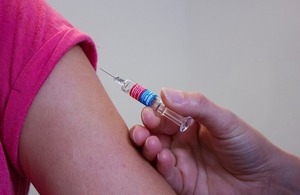HPV vaccine reduces cancer-causing infection by 86 per cent
A new study has found that the HPV vaccination has led to major reductions in the number of young women who have the infection, which can cause cervical cancer.

Someone receiving a HPV vaccine.
Human Papilloma Virus (HPV) 16 and 18 infections, which cause the majority of cervical cancer cases, decreased by 86% in women aged 16 to 21 who were eligible for the vaccination as adolescents between 2010 and 2016.
The surveillance data from England was published today (Monday 18 June 2018) in the Journal of Infectious Diseases. Overall, declines were seen across 5 high-risk HPV types, which together cause around 90% of cervical cancer cases, as well as low-risk HPV types.
The results suggest that the HPV vaccination programme will bring about large reductions in cervical cancer in the future. Cervical cancer is currently the most common cancer in women under 35, killing around 850 women a year.
In addition, the programme has led to a marked decline in genital wart diagnoses. The number of genital wart diagnoses in sexual health clinics fell in girls aged 15 to 17 by 89%, and in boys of the same age by 70%, between 2009 and 2017 as a result of herd immunity. Genital warts are caused by some low-risk strains of HPV, which the current vaccine also protects against.
Mary Ramsay, Head of Immunisations, Public Health England (PHE), said:
These results are very promising and mean that in years to come we can expect to see significant decreases in cervical cancer, which is currently one of the biggest causes of cancer in women under 35.
This study also reminds us how important it is to keep vaccination rates high to reduce the spread of this preventable infection. I encourage all parents of girls aged 12 to 13 to make sure they take up the offer for this potentially life-saving vaccine.
As well as seeing a significant reduction in the high-risk types 16 and 18, the study also showed clear declines in the prevalence of HPV31, HPV33 and HPV45, which are not included in the current vaccine. This builds on existing evidence which suggests the vaccine also offers some cross-protection to unvaccinated women against related HPV types that can also cause cervical cancer.
Robert Music, Chief Executive, Jo’s Cervical Cancer Trust:
It is extremely positive to see the impact that the vaccination has had on prevalence of cervical cancer causing HPV infection among vaccinated women. One day we hope to see cervical cancer become a disease of the past and it is only through high vaccination rates that we will get there. For women who have had the vaccine, it is important to remember it does not offer full protection against cervical cancer so attending cervical screening when invited is still important.
Most HPV infections are cleared by the immune system with no symptoms, but some high-risk types of HPV (16 and 18) cause cervical cancer.
The HPV vaccination programme was first introduced in 2008. Over 80% of people aged 15 to 24 have now been vaccinated in the UK and 80 million have received the vaccine worldwide.
The study reminds us of the importance of maintaining high take up amongst girls who are offered the vaccine through the school vaccination. The vaccine was found to be less effective in females who receive it in later adolescent years, due to an increased likelihood of prior exposure to the virus through sexual activity.
All girls can get the HPV vaccine free from the NHS from the age of 12 up to their 18th birthday. The vaccination programme is delivered through schools, but if girls miss out they can request it from their GP surgery.
Background:
- Read the paper published in the Journal of Infectious Diseases.
- In England, girls aged 12 to 13 years are routinely offered the first HPV vaccination when they’re in school year 8. The second dose is normally offered 6 to 12 months after the first (in school year 8 or year 9). It’s important to have both doses to be protected.
- Men who have sex with men (MSM) do not benefit in the same way from the girls’ programme. From April 2018, MSM up to and including the age of 45 are eligible for free HPV vaccination on the NHS when they visit GUM (genitourinary medicine) clinics and HIV clinics in England.
- For more information, comment or media interviews, please contact the PHE press office: